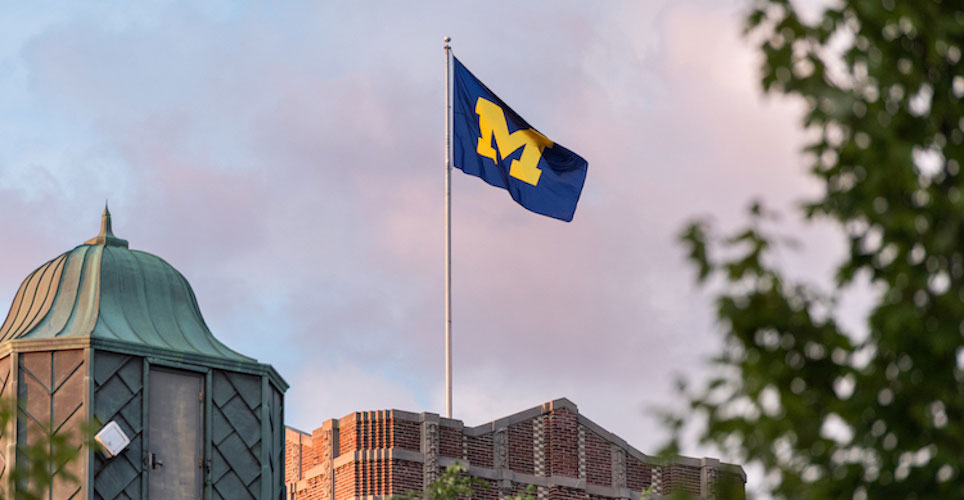
The comprehensive health and safety response that the University of Michigan created during the first months of the COVID-19 pandemic has transitioned to a new phase.
With the expiration of the federal government’s COVID-19 public health emergency May 12 and as regional transmission rates remain low, the university modified several campuswide measures enacted nearly three years ago.
Rob Ernst, chief health officer, executive director of UHS, and associate vice president for health and wellness in Student Life, noted the updates reflect several months of stable infection rates, and effective monitoring and mitigation measures.
“We have moved far beyond the first year of the pandemic with the deployment of effective vaccines, better medications to treat the virus, and a range of tools to monitor conditions beyond individual case counts and asymptomatic testing,” Ernst said.
Health, Drug, PTO Benefits Affected
The following measures apply to faculty, staff and learners across all U-M campuses:
-
Costs for COVID-19 medical services, such as testing and treatment, reverted to normal pre-pandemic rates and requirements, effective May 12. This means members covered by U-M Health Plans pay regular coinsurance or copays for these services, including charges for using out-of-network providers.
-
Also effective May 12, over-the-counter rapid antigen COVID-19 tests are no longer covered by U-M’s Prescription Drug Plan. Members have through May 2024 to submit reimbursement claims to Magellan Rx for eligible, previously purchased test kits.
-
COVID-19 treatment drugs Paxlovid and its generics, nirmatrelvir/ritonavir, continue to be covered by the U-M Prescription Drug Plan, with no member cost-share as long as the U.S. government pays for these products.
-
COVID-19 vaccinations continue to be covered at no cost to members. U-M Health Plans cover all vaccinations at 100% as preventive services.
-
As of May 13, the emergency COVID-19 paid-time-off program for faculty and staff, as well as the additional 120-hour special-use PTO bank at Michigan Medicine, were discontinued. Employees should use regular PTO programs as needed.
-
The university’s Community Sampling and Tracking Program in Ann Arbor closed after May 12. Sites at Pierpont Commons and the Stephen M. Ross School of Business’ Blau Hall are distributing free OTC rapid antigen tests and face coverings while supplies last. The Occupational Health Services COVID-19 testing site also closed.
“CSTP provided critical data for our campus and peace of mind for many individuals,” Ernst said. “At its peak, CSTP was handling 17,000 tests per week. But as demand has significantly decreased and as wastewater testing and other monitoring methods have improved, we have reached a point where we can safely close down CSTP.”
University Vaccination Updated
In February, the university narrowed its vaccination policy to require only students living in Michigan Housing facilities on U-M’s Ann Arbor campus to submit proof they received the COVID-19 vaccine. Following updated U.S. Centers for Disease Control and Prevention guidance last month, the policy was further revised to require a single dose of bivalent COVID-19 vaccine.
Some units still have their own policies in place, such as vaccinations required for health care and field placements. Michigan Medicine, the School of Dentistry and University Health Service maintain their own policies.
Ernst encouraged U-M community members to stay up to date on their COVID-19 vaccinations as recommended by the CDC, use face coverings for enhanced personal protection in areas of high transmission, and keep a supply of rapid antigen tests on hand.
Michigan Medicine relaxed its face-covering policy to require masking only during specific conditions at clinical facilities. Individuals who test positive for or have been exposed to COVID-19 should wear appropriate face coverings in clinical facilities through day 10 of their isolation or self-monitoring periods.
New Phase, Not Last Phase
Ernst also clarified that the transition into this next phase of pandemic response does not signify that the virus is gone.
“COVID-19 is still a public health concern, but we are better prepared to respond,” he said. “The public health-informed infrastructure we have built to combat a potential high volume of cases in the future has vastly improved since the pandemic first began.”
U-M will continue to offer guidance when notable changes in COVID-19 or other public health conditions occur.
